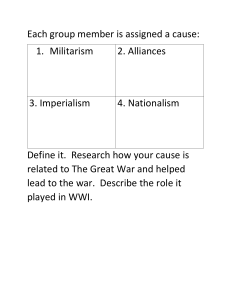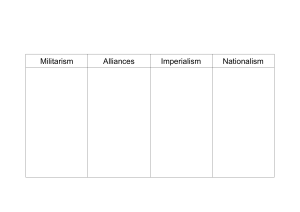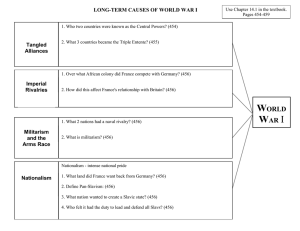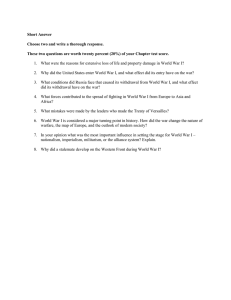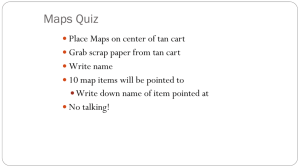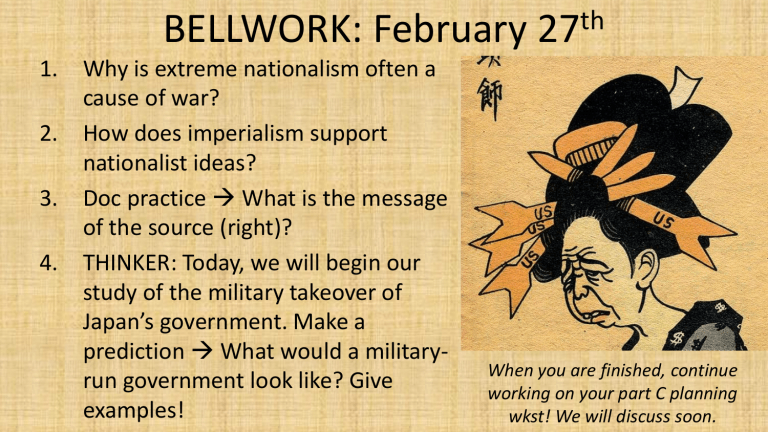
BELLWORK: February 27th 1. 2. 3. 4. Why is extreme nationalism often a cause of war? How does imperialism support nationalist ideas? Doc practice What is the message of the source (right)? THINKER: Today, we will begin our study of the military takeover of Japan’s government. Make a prediction What would a militaryrun government look like? Give examples! When you are finished, continue working on your part C planning wkst! We will discuss soon. EA1 – The Move to Global War • The Move to Global War (Prescribed Subject #1) – 1931-1941 – Rise of nationalist, militarist, totalitarian regimes in the inner-war period – Case Study #1: Expansion of Japan into East Asia and response of Western democracies – Case Study #2: Rise of Italian Fascism and German Nazism and how their expansion ended “collective security” • This unit is the entirety of testable content for EA1 which is a document-based assessment. • We will complete a mock assessment for EA 1 after Spring Break and a full EA1 will be included as part of your final in May. Japanese Expansionism in East Asia 1.1 The Impact of nationalism and militarism on Japan’s foreign policy: the origins What were the origins of Japanese nationalism and militarism? (pg.15) Growing nationalism . . . Why? Transform Japan into Western-style power, lead Asia, secure markets/materials, security, popular support linked to Imperialist foreign policy. . . How? In pursuit of nationalist goals, Japan took over other Asian territories reliant on Militarism. . . Why? Military needed to take action, expand and make political decisions Factors that contributed to the growth of Japanese nationalism and militarism • • • • • • • • Determination to transform Japan into a Western-style power Desire for equality with Western powers Japan’s belief in its destiny as the leader of Asia Need to obtain raw materials and secure markets in East Asia Need for strategic security Actions of the Western powers Growing popular support for militarism and expansionism in Japan ***These factors motivated Japan to implement an imperialist foreign policy. In order to do this, they relied on a strong military to take action and make political decisions*** 1.1 Reading Assignment • As you read this section, focus on the factors that contributed to the growth of Japanese nationalism/militarism (pages 15-24) • I will complete a note check, so make sure you: – Read for understanding! – Keep notes organized as an outline, Cornell style, or mind map – Also, annotate the sources – this is preparing you for a source-based exam practice these skills! BELLWORK 3/6: EA1 Practice! After Japan modernizes their military, they go to war with China! (First Sino-Japanese War: 1894-5). Japan’s victory makes them a world power and starts their empire; meanwhile, it was a humiliating defeat for China. Read the sources about this conflict and answer the following questions! 1. According to Source A, why were the Japanese so excited about the victory over China in 1895? (Pg. 17) 2. What was the Triple Intervention? (Pg. 18) 3. Read sources C & D on page 18 List two similarities and two differences. 4. Analyze the political cartoon on page 24 What is the message with regard to China? Effects of First Sino-Japanese War BELLWORK: March th 7 1. List five effects of Perry’s arrival in Japan. 2. Why was Manchuria so important to Japan? 3. How did the Russo-Japanese War impact Japan’s status as a world power? 4. Describe Japan’s shift to a foreign policy of internationalism in the 1920’s. 5. How did political instability in China encourage the growth of Japanese nationalism/militarism? 6. THINKER: Why did the “open door” seem to positively impact Japan, but negatively impact China? Perry’s Arrival in Japan • 1192-1853: Japan isolated itself to prevent spread of Christianity • 1853: Perry and his “Black Ships” arrive in Japan • 1854: Treaty of Kanagawa was signed • How did this change the government? • How did this change the military? • How did this change society? • 1868-1912 (Meiji period): first half of the Empire of Japan when Japanese society moved from being an isolated feudal society to its modern form Meiji Period: 1868-1912 • “rich country, strong military” Effects of First Sino-Japanese War Manchuria! why was it important to Japan? • Agriculturally rich • Mineral rich • Could supply resources to Japan • Living space for Japan’s growing populous • Buffer against Russia • Clashed with Russia over control in 1904 = war • Increased control as a result of WWI Russo-Japanese War (1904) • Japan’s confidence was boosted by 1902 AngloJapanese Alliance • Clash over interests in Korea and Manchuria • Japan surprisingly defeats Russia! Navy! • Treaty of Portsmouth How did the Russo-Japanese War impact Japan’s status as a world power? Effects of Russo-Japanese War • Japan gained control of Korea and Manchuria • Fostered respect of the West • Increased admiration by other Asian nations • Affirmed Japan’s own belief in its destiny as leader of Asia • The cost of war and defending new territories increased the demand for a stronger army • By 1906, Japan was obsessed with security, pursuit of an empire and status as a world power Japan and Internationalism How did political instability in China encourage the growth of Japanese nationalism/militarism? THINKER: Why did the “open door” seem to positively impact Japan, but negatively impact China? Poster Review Project: Origins of Japanese Militarism and Nationalism • With a group, you will create a poster used to review an important topic from the chapter • Your poster should highlight the MAIN idea(s), but focus specifically on how your event impacted Japanese militarism and nationalism • Make it visually appealing • Be creative! Poster Topics 1. Effects of first Sino-Japanese War (include impact on China and the Triple Intervention) 2. Effects of World War I on Japan (include “21 demands” and economic impact) 3. Japan’s desire for equality with the West (include Washington Treaties and why it felt it was NOT being treated equally) 4. Japan’s problems during 1920’s (include failure of democracy, economic problems and internal divisions) 5. Japanese expansion (include civilian support, need for raw materials/markets, and strategic security) Poster Groups Period 5 1. Ginelle, Iliana, Alexis 2. Eliza, Kaitlyn, James 3. Anya, Natalie, Raymond 4. Abby (x2), Ronda, Jude 5. Nicholas, Alex, Ashley Period 6 • Raquel, Grace C. • Bethany, Matthew • Edgar, Gabriel, Grace L • Jeff, Nick, Veronica • Belen, Precsilla, Steph Effects of WWI on Japan • Treaty of Versailles allowed Japan to annex German Pacific territories – China angered over these gains • Economic benefit of WWI: Japan became more self-sufficient; without competition in the region, their economy boomed • Major concern of US and Britain was Japan’s influence over China (1921 Washington Conference) Japan obtains control of Mariana, Marshall, Kiribalti Islands Japan’s Economic boom during WWI Japan’s desire for equality with the West Tonnage limitations Country Capital ships Carriers Britain 525,000 tons 135,000 tons U.S. 525,000 tons 135,000 tons Japan 315,000 tons 81,000 tons 175,000 tons 60,000 tons 175,000 tons 60,000 tons France Italy Japan felt the League of Nations treated it as unequal “The Yellow Peril” 1920’s – Japan’s problem years • Although WWI made Japan the industrial center of the East, they still faced economic problems: – Profits from war were not invested well – A lot of money spent on funding Chinese warlords – Foreign debt remained high – Printed money = inflation – Riots over rice availability – Riches made from war stayed in hands of wealthy Japan in the 1920’s: peaceful? Liberal? • When the economic crisis hit, radical political factions formed • Despite the growing power/popularity of the left, the undercurrent of right-wing nationalism remained – 1921: PM Hara was assassinated – Three ineffective leaders followed – Gov. cut military spending (tensions grow btwn. gov/mil) – Military began to act without government consent (invasion of Manchuria) – 1926: Emperor Hirohito (Emperor through WWII, pressured by military) – 1929: GD = silk economy collapsed, unemployment, limit expansion, cut mil $ – 1930: PM Hamaguchi was assassinated Japanese Expansion Political Transition: from left to right • The more liberal era during the 1920’s was short lived, as the army reasserted itself in the 1930’s. • Japan had a history of strong nationalism, but as the military gained more and more influence, Japan became increasingly aggressive. • • • • • • • Factors that contributed to the growth of Japanese nationalism and militarism Determination to transform Japan into a Western-style power Desire for equality with Western powers Japan’s belief in its destiny as the leader of Asia Need to obtain raw materials and secure markets in East Asia Need for strategic security Actions of the Western powers Growing popular support for militarism and expansionism in Japan • ***Out of all of these factors, which do you feel contributed the MOST to the rise of Japanese militarism and nationalism?*** 3/14 1.2 Reading & Notes: Impact of nationalism & militarism on foreign policy • Japanese Expansion in Southeast Asia (3 examples): – Mukden Incident (invasion of Manchuria) – Second Sino-Japanese War – Japan’s attack on Pearl Harbor • Read pgs. 29-38! Your notes/annotations should focus on: – Causes of expansion – Events leading to the takeover of Manchuria – Impact on Japan, Manchuria, China and international relations – Annotate the sources!!! • I will check the 1.2 notes for points after Spring Break! Your Guide for Paper 1/EA1: Pgs. 1-13 • The Move to Global War (Prescribed Subject #1) – 1931-1941 – Rise of nationalist, militarist, totalitarian regimes – Case Study #1: Expansion of Japan into East Asia and response of Western democracies – Case Study #2: Rise of Italian Fascism and German Nazism and how their expansion ended “collective security” • As you read “Your Guide for Paper 1,” summarize the following pts: – – – – Preparing for Paper 1 What you can expect on Paper 1 How to approach the source questions for Paper 1 Helpful Tips for Paper 1 • We will complete a mock assessment for EA 1 after Spring Break – so be prepared! Understand the questions, tactics and bring EA guide!
